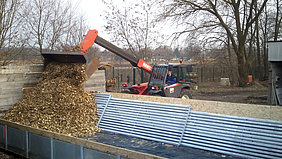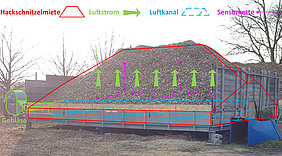Controlled cold air ventilation not only enables the drying of woodchips stored in piles to moisture contents of less than 15 percent within four weeks, it also cuts the usual dry matter losses of up to 20 percent in half. The process is energy-efficient: The thermal energy gain due to the fast drying makes up for more than 6 times the electric energy for the blower operation, as a study by scientists from the Leibniz Institute of Agricultural Engineering and Bioeconomy reveals. The study was recently published in the journal Biomass and Bioenergy.
The cultivation of fast-growing woody plants such as poplars, willows and black locust trees on agricultural land in short rotation plantations or agroforestry systems offers many advantages to both farmers and the environment. Once established, the trees can be harvested in so-called short rotation at intervals every 3 to 7 years. When harvested in winter, the woodchips have moisture contents of 40 to 60 percent. Until being used in the following heating season, the woodchips are usually dried and stored in large outdoor piles - a method that at first glance appears to be cost-efficient. However, considerable losses can occur during the drying period. Due to microbiological-chemical processes, the temperatures in the woodchip piles may rise to 50 to 70°C during the first weeks. This leads to increased degradation of organic matter. During a storage period of 6 months, dry matter losses of up to 30 percent can occur, depending on the type of wood, particle size, storage construction and weather conditions. Various approaches to reduce these losses, such as harvesting and drying of entire trunks or technical drying, have so far not yielded satisfying results.
This was the motivation for ATB scientists in cooperation with partners from TU Dresden and Kluge GmbH, to develop and test a new system for active ventilation of poplar wood chips with ambient air. Cold air ventilation is already used in agriculture, for example to dry grain or hay in summer. One of the challenges in drying freshly harvested poplar woodchips is to dry under early spring conditions, when the ability of the ambient air to absorb moisture is significantly lower than in summer.
The new system of air ducts for sensor-controlled ventilation and drying was tested on two piles of poplar chips, each with a total volume of 90 cubic metres. Ventilation was carried out in two phases: subsequent to the harvest in March, cold air was blown in for cooling, while under the more favourable weather conditions in April, the air was used for drying. The high temperature rise in the pile typically immediately following storage intake, could be limited to an average temperature of 6.3 °C by blowing in cold ambient air for only 41 hours. With a subsequent 196 hours of blower operation in the second phase, the moisture content within the pile could be reduced from 51.5 to 11.9 percent. The total energy input for cooling and drying was 456 MJ per tonne of dry matter. With a total electrical energy demand of 5332 MJ per storage pile, a more than sixfold thermal energy benefit of 35233 MJ was achieved compared to the energy losses in calorific value.
"The pile should preferably be cooled at ambient temperatures of below 0°C. This enables most efficient cooling and also prevents fungal growth almost completely," adds ATB scientist Dr Carsten Lühr. "From our point of view, it is crucial to carry out the drying at a good pace with the longest possible daily drying intervals. In our experiment, we achieved a final moisture content of 12 per cent. For the combustion in heating systems, this is not even needed. We could have ended the drying earlier and thus saved energy." Therefore, the scientists will enhance the system so that it will be possible to control the blower precisely on the basis of the current drying progress. Moreover, the use of mobile air ducts that can be used for versatile drying purposes could be a cost-effective alternative to the stationary ventilation system under investigation.
Background: For farmers, the cultivation of fast-growing wood species such as poplar, willow and robinia offers numerous advantages, including an improvement in crop rotation, the shifting of labour peaks into the winter season as well as additional income. Perennial crops reduce soil erosion, increase the humus content in the topsoil, sequester CO2 in the root zone and they withstand drought better than other crops. Despite these advantages, short rotation coppice is currently grown on only about 6600 ha in Germany. There are many reasons for this: the lack of economic incentives due to the current low price level for forest wood as well as fossil fuels, the still insufficient availability of powerful machines, especially for harvesting, and the losses in quality and dry matter that have so far been recorded after harvesting.
The Leibniz Institute for Agricultural Engineering and Bioeconomy (ATB) has been intensively researching the cultivation, harvesting, storage and use of short-rotation coppice. The permanent trial with poplars and willows established in Potsdam as early as 1994, one of the longest-running experimental sites for short-rotation coppice in Germany, is still providing extensive data for research, e.g. on the emission of soil-borne greenhouse gases, and provides a basis for the development of methods and technology. In 2019, ATB applied its profound expertise for its own benefit: Today, poplars - grown on 36 hectares and harvested with a mowing chopper developed by ATB - provide 50 percent of the energy for the heat supply of the ATB campus.
The project "Energy-efficient ventilation drying for the production of quality wood chips - BeTros", completed in 2019, was funded by the German Federal Ministry of Economic Affairs and Energy (BMWi) under the Central SME Innovation Programme (ZIM) and supported by the funding agency Arbeitsgemeinschaft industrieller Forschungsvereinigungen "Otto von Guericke" e.V. (AiF).
Original publication:
Lühr, Carsten; Pecenka, Ralf; Lenz, Hannes; Hoffmann, Thomas (2021): Cold air ventilation for cooling and drying of poplar wood chips from short rotation coppice in outdoor storage piles in Germany. Biomass and Bioenergy 146 (March 2021): 105976. https://doi.org/10.1016/j.biombioe.2021.105976
Information on Youtube (in German): https://youtu.be/Xxf-Ff6F5kI
Contact:
Dr.-Ing. Carsten Lühr - Dept. Postharvest Technology
Tel.: 0331 5699-322, E-Mail:
Dr.-Ing. Ralf Pecenka - Working Group Leader Process Engineering for Energy Crops
Tel.: 0331 5699-312, E-Mail: rpecenka@atb-potsdam.de
Helene Foltan
Public Relations
Tel.: 0331 5699-820, E-Mail: presse@atb-potsdam.de
Leibniz Institute for Agricultural Engineering and Bioeconomy (ATB)
Max-Eyth-Allee 100, 14469 Potsdam, Germany


